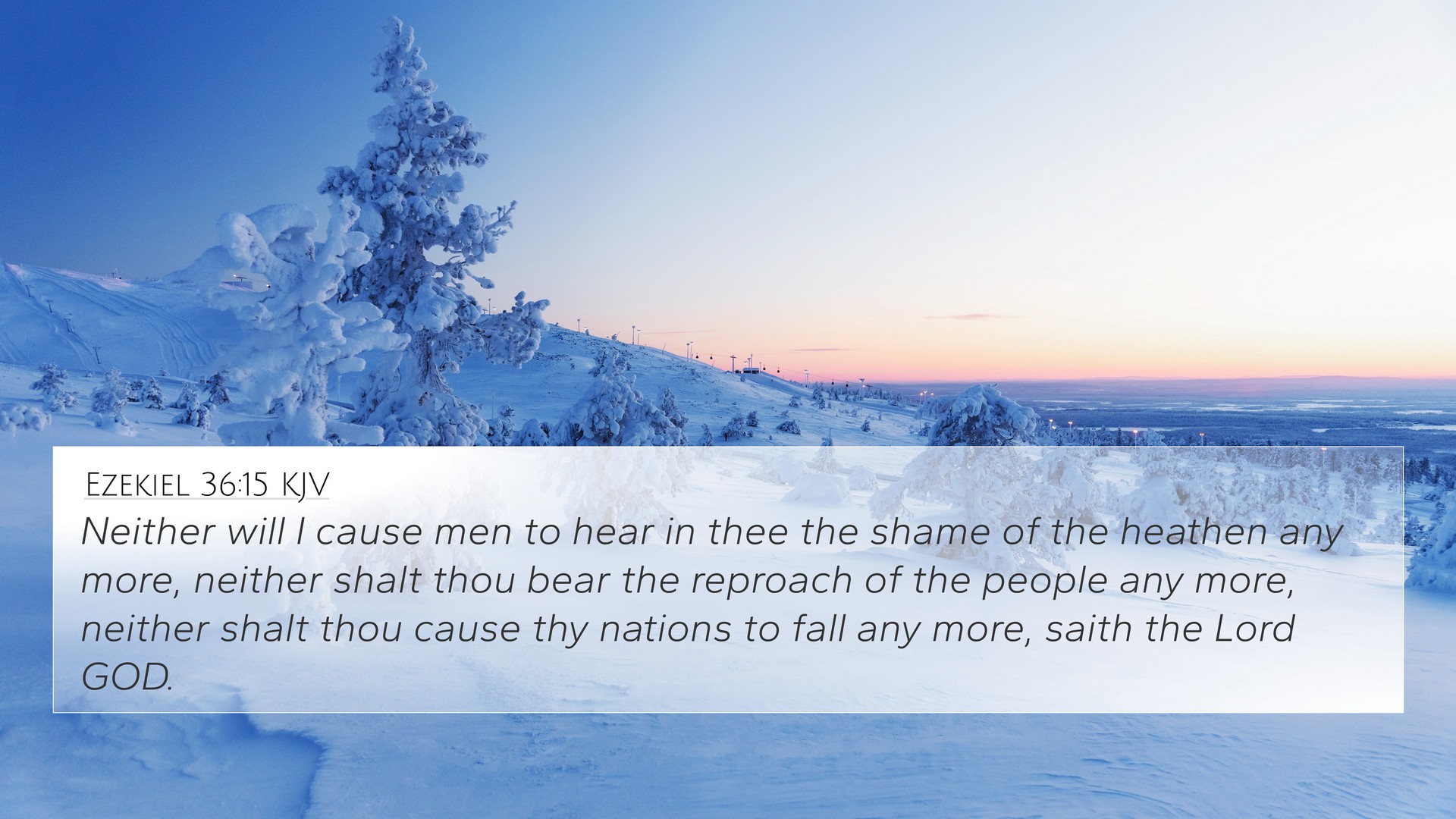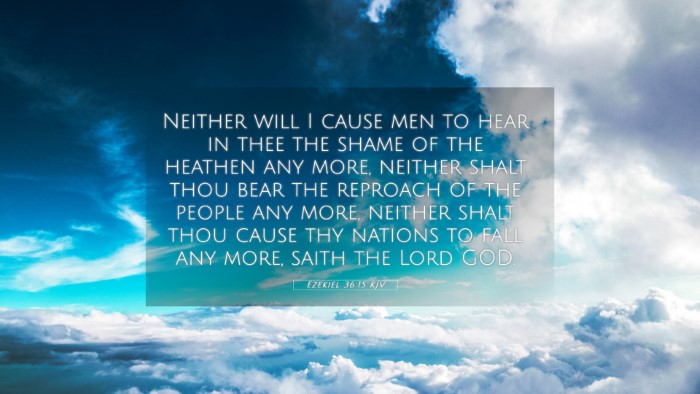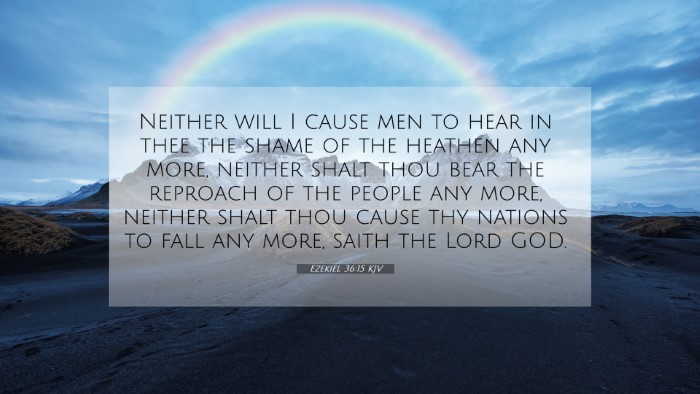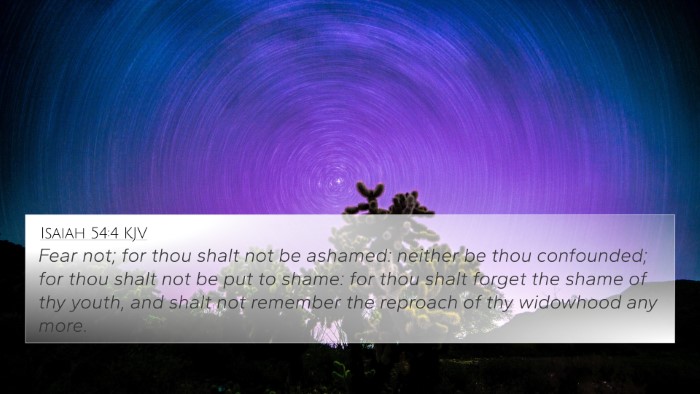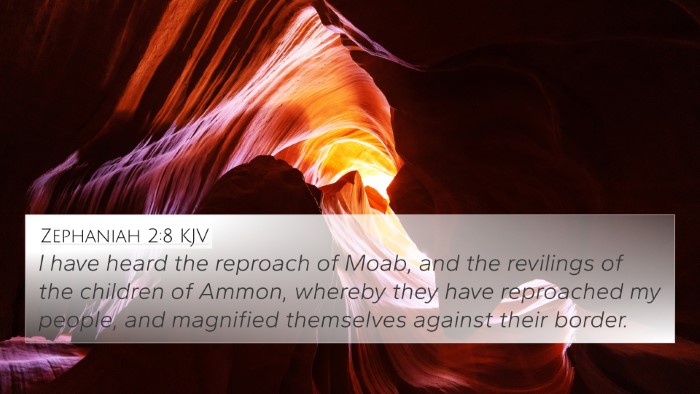Ezekiel 36:15 - Verse Meaning and Interpretation
Ezekiel 36:15 reads: "Neither will I cause men to hear in thee the shame of the nations any more, neither shalt thou bear the reproach of the people any more, neither shalt thou cause thy nations to fall any more, saith the Lord God." This verse expresses a commitment from God to remove shame, reproach, and negative identity from His people, signaling a restoration and a profound change in their status.
Summary of Insights from Public Domain Commentaries
Matthew Henry's Commentary
Matthew Henry emphasizes that this verse indicates a change in the spiritual state of Israel. God promises to silence the reproach from surrounding nations, suggesting a time of healing and restoration for His people. The disgrace that had characterized their history – a consequence of their sins – will no longer hold sway. This serves as a message of encouragement, highlighting God’s unyielding mercy and salvation.
Albert Barnes' Notes on the Bible
According to Albert Barnes, the prophetic declaration lands on God's intention to protect His people from future shame related to idolatry and sin. This verse points to the fulfillment of God’s covenantal promises, leading the people away from past transgressions to a renewed era of dignity before the nations. The emphasis on not bearing reproach illustrates the transformation of reputation that God aims to achieve among His people.
Adam Clarke's Commentary
Adam Clarke highlights that this scripture epitomizes the redemptive nature of God’s promises. He discusses how the assurance of no more reproach is connected deeply to the themes of forgiveness and restoration. Clarke points out that the verse portrays a Divine act where God aims to purify His people, allowing no more occasions for their enemies to mock or belittle them. The renewed identity given by God marks a pivotal shift in how the people of Israel are perceived both by themselves and others.
Thematic Connections and Cross-References
This verse is rich in themes of restoration, identity, and divine mercy. Below are some Bible verse cross-references that illustrate similar ideas:
- Isaiah 54:4: “Fear not; for thou shalt not be ashamed; neither be thou confounded; for thou shalt not be put to shame...” This verse echoes the promise of no shame, reinforcing themes of reassurance and hope.
- Jeremiah 31:20: “Is Ephraim my dear son? Is he a pleasant child? For since I spake against him, I do earnestly remember him still...” This speaks to God's unwavering love towards His people despite their failings.
- Zephaniah 3:19: “Behold, at that time I will undo all that afflict thee... and I will get them praise and fame in every land where they have been put to shame.” This connects beautifully with the theme of removing reproach.
- Romans 8:1: “There is therefore now no condemnation to them which are in Christ Jesus...” Linking the New Testament promise to the Old Testament theme of restoration.
- 2 Corinthians 5:17: “Therefore if any man be in Christ, he is a new creature: old things are passed away; behold, all things are become new.” This reflects the transformative nature of God's promise.
- Revelation 21:4: “And God shall wipe away all tears from their eyes; and there shall be no more death, neither sorrow, nor crying...” A fitting connection that conveys complete restoration and healing.
- Psalms 25:3: “Yea, let none that wait on thee be ashamed...” This is a reminder of God's faithfulness to those who trust in Him.
Understanding the Significance of Cross-Referencing Biblical Texts
This verse not only contributes to the narrative of Ezekiel but also connects widely with the overarching themes throughout Scripture. Understanding inter-biblical dialogue helps readers to perceive the richness of God's plans and His consistent character of faithfulness.
Tools for Bible Cross-Referencing
To aid in studying verses like Ezekiel 36:15, consider using:
- Bible Concordance: A helpful tool for locating specific words and phrases in the Bible for deeper understanding.
- Cross-Reference Bible Study: Guide your reading with resources that point to related scriptures.
- Comprehensive Bible Cross-Reference Materials: Utilize books and online tools designed for cross-referencing Bible verses.
Conclusion
In conclusion, Ezekiel 36:15 serves as a powerful reminder of God's redemptive purpose for His people. With context drawn from prominent commentaries and scriptural cross-references, this verse uncovers a profound assurance of hope that transcends time, encouraging believers to embrace their identity in Christ and appreciate the restoration promised in the Scriptures.
